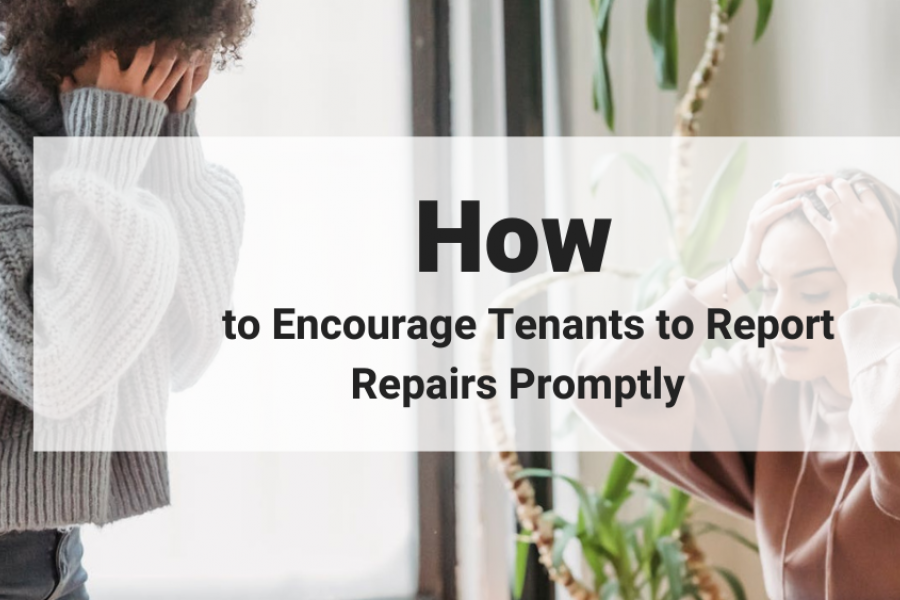
Key Takeaways
- Clear expectations and easy reporting systems help tenants feel comfortable notifying landlords about maintenance issues, no matter how small.
- Trust and transparency are essential—when tenants know they won’t be unfairly blamed or charged, they’re more likely to report problems early.
- Quick, professional responses to repair requests build tenant confidence and reinforce the importance of timely communication.
- Regular check-ins, reminders, and education empower tenants to recognize and report issues before they turn into costly repairs.
Have you ever walked into one of your rental properties and discovered damage that had gone unreported for months? Maybe it was a leaky faucet that caused mold under the sink, or a cracked window letting in drafts.
These types of situations can lead to costly repairs and tenant dissatisfaction. As a landlord, you know that minor issues can turn into major expenses when they are not addressed in time. So why do tenants sometimes hesitate to report problems?
There are many reasons tenants might delay reporting maintenance issues. Some might think the problem is too small to mention, while others might not want to bother the landlord. In some cases, tenants might worry they will be blamed or charged for the repair.
Regardless of the reason, it is important to address these barriers. Timely maintenance is essential to keeping properties in good condition and ensuring tenant safety and satisfaction.
To help with this, State Property Management put together this article to guide landlords in encouraging tenants to report repairs as soon as they occur.
Central Florida’s Property Management Specialists! Call today: (407) 634-2800
Creating an Environment That Encourages Prompt Repair Reporting
1. Set Expectations Early
From the beginning of the lease agreement, make it clear that tenants are expected to report all maintenance issues, no matter how small.

Clarify that this helps prevent more serious problems and keeps the home safe and comfortable. You can communicate this during the lease signing, move-in walkthrough, or in a welcome packet.
2. Make the Reporting Process Simple
Tenants are more likely to report issues if the process is easy to understand. Provide clear instructions on how and where to report problems.
Whether it's by phone, email, or an online system, choose a method that is convenient for your tenants. Avoid complex steps or forms that could discourage tenants from reaching out.
3. Reassure Tenants About Costs and Responsibility
Some tenants may avoid reporting repairs because they worry they’ll be blamed or charged.
Make it clear that they are not financially responsible for normal wear and tear or general maintenance. Reassure them that prompt reporting will not result in penalties, and it actually helps keep the property in better condition.
4. Respond Quickly and Professionally
When tenants do report issues, respond as soon as possible. A quick acknowledgment builds trust and shows that you take their concerns seriously.
Even if a repair cannot be done right away, keeping the tenant updated on the status helps them feel heard and respected.
5. Build a Respectful Landlord-Tenant Relationship
Tenants are more likely to communicate openly if they are respected. Communicate with tenants in a respectful and courteous manner during all interactions.
.jpg)
Address their concerns promptly and professionally. Maintaining a respectful relationship makes tenants willingly report problems.
6. Send Occasional Reminders
Don’t assume tenants will always remember to report issues. Include friendly reminders in monthly rent notices, newsletters, or seasonal property updates.
A simple message like “Please let us know if you notice anything that needs fixing” can go a long way in keeping the lines of communication open.
7. Conduct Periodic Check-ins
Use scheduled property inspections or maintenance visits as opportunities to ask tenants if they’ve noticed any problems. These face-to-face conversations can help identify issues that tenants might otherwise overlook or hesitate to report.
8. Educate Tenants on the Consequences of Delays
Sometimes tenants may not understand how a small issue can become a bigger problem. Take time to explain that reporting a leaky faucet or a small crack early can prevent larger damage and longer repair times later.
This helps tenants understand their role in preventing unnecessary costs or inconvenience.
9. Consider Offering Incentives
While not required, some landlords find that offering a small incentive can increase tenant participation. For example, a gift card or small rent credit for timely reporting during inspections or maintenance visits can motivate tenants to speak up sooner rather than later.

10. Keep a Record of Repair Reports and Resolutions
Maintain a log of reported issues, including dates, descriptions, and resolutions. Encourage tenants to document the problem with photos if needed. This helps ensure transparency, keeps you organized, and provides a reference if questions or disputes come up later.
Bottom Line
Encouraging tenants to report repairs promptly is essential for keeping your rental property in good condition, reducing long-term repair costs, and ensuring tenant satisfaction.
Tenants are more likely to report issues when they understand the importance, trust the process, and feel comfortable communicating with their landlord. Clear communication, quick responses, respectful treatment, and occasional reminders can all contribute to better reporting behavior.
At State Property Management, we understand the challenges landlords face in keeping their properties well-maintained.
We help by providing clear systems, proactive communication, and professional support to ensure that maintenance issues are identified and handled quickly. Our team works with landlords and tenants to make the repair process smooth and reliable.
If you're looking for ways to improve maintenance reporting and protect your property, contact State Property Management today.